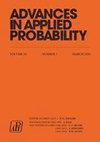停车功能:跨学科连接
IF 0.9
4区 数学
Q3 STATISTICS & PROBABILITY
引用次数: 4
摘要
摘要假设在一个有n个停车位的线性停车场中,m名司机每人选择一个首选停车位。按照顺序,每个司机都会去他们选择的地点,如果可能的话,把车停在那里,否则,如果有,就去下一个可用的地点。如果所有驾驶员都成功停车,则选择的顺序称为停车功能。经典的停车功能对应于$m=n$的情况。我们研究了均匀停车函数的各种概率性质。通过一个称为停车函数多重洗牌的组合结构,我们给出了在一般情况$m\lesssim-n$下多坐标定律的一个公式。我们进一步推导了所有可能的协变:在两个坐标之间,在一个坐标和一个未受诱惑的点之间,以及在两个未受引诱的点之间。一般情况$m\lesssim n$中的这种渐近情形与特殊情况$m=n$的渐近情形形成鲜明对比。还研究了停车函数的一个推广,称为区间停车函数,其中每个驾驶员只愿意在固定的停车点区间停车。我们构造了具有n个车和n个点的区间停车函数与具有$n+1$个顶点和指定根的边标记生成树之间的双射族。本文章由计算机程序翻译,如有差异,请以英文原文为准。
Parking functions: interdisciplinary connections
Abstract Suppose that m drivers each choose a preferred parking space in a linear car park with n spots. In order, each driver goes to their chosen spot and parks there if possible, and otherwise takes the next available spot if it exists. If all drivers park successfully, the sequence of choices is called a parking function. Classical parking functions correspond to the case
$m=n$
. We investigate various probabilistic properties of a uniform parking function. Through a combinatorial construction termed a parking function multi-shuffle, we give a formula for the law of multiple coordinates in the generic situation
$m \lesssim n$
. We further deduce all possible covariances: between two coordinates, between a coordinate and an unattempted spot, and between two unattempted spots. This asymptotic scenario in the generic situation
$m \lesssim n$
is in sharp contrast with that of the special situation
$m=n$
. A generalization of parking functions called interval parking functions is also studied, in which each driver is willing to park only in a fixed interval of spots. We construct a family of bijections between interval parking functions with n cars and n spots and edge-labeled spanning trees with
$n+1$
vertices and a specified root.
求助全文
通过发布文献求助,成功后即可免费获取论文全文。
去求助
来源期刊

Advances in Applied Probability
数学-统计学与概率论
CiteScore
2.00
自引率
0.00%
发文量
64
审稿时长
6-12 weeks
期刊介绍:
The Advances in Applied Probability has been published by the Applied Probability Trust for over four decades, and is a companion publication to the Journal of Applied Probability. It contains mathematical and scientific papers of interest to applied probabilists, with emphasis on applications in a broad spectrum of disciplines, including the biosciences, operations research, telecommunications, computer science, engineering, epidemiology, financial mathematics, the physical and social sciences, and any field where stochastic modeling is used.
A submission to Applied Probability represents a submission that may, at the Editor-in-Chief’s discretion, appear in either the Journal of Applied Probability or the Advances in Applied Probability. Typically, shorter papers appear in the Journal, with longer contributions appearing in the Advances.
 求助内容:
求助内容: 应助结果提醒方式:
应助结果提醒方式:


